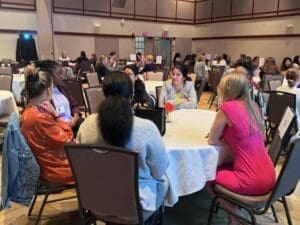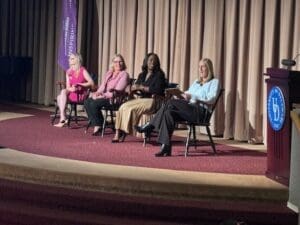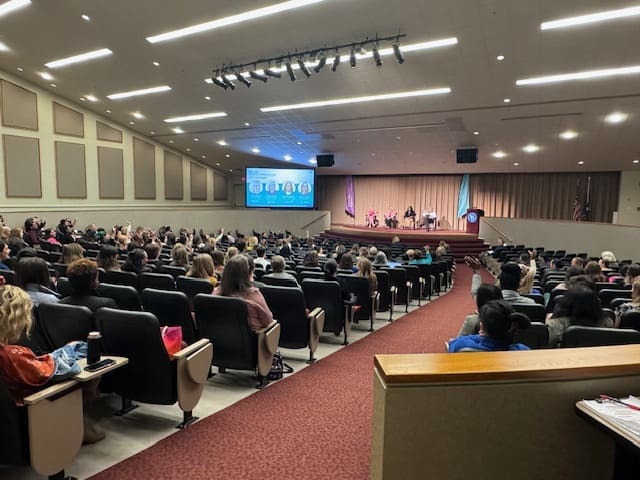

About 250 people attended Thursday’s Inspiring Women in STEM Conference sponsored by Delaware Bio.
Four generations of women are working together in the bioscience industry, and all bring different viewpoints, expectations and behaviors, attendees were told Thursday during Delaware Bio‘s Inspiring Women in STEM 2023 Conference.
They can all learn from each other, panelists said during a Bridging Generations session.
“A lot of times we are the ones that doubt ourselves or whether or not we’re capable of doing it.,” said panelist Erica Woolridge, lead of of AstraZeneca’s Global Supply Americase Regional Learning and Development. “We’re doing it, right? It’s happening. So this conversation around how we partner together generations is super important because there’s so much that we can learn from each other.”
The annual conference is designed to offer professional development and networking that encourages and inspires women in science, technology, engineering and math jobs.
It’s the largest and longest-running Women in STEM program in the region, Kathi Vidal, director of the United States Patent and Trademark Office, told attendees in a video address.
The conference started about 10 years ago and during the early pandemic continued online.
About 250 women of all ages and a variety of jobs, including industrial and government scientists and engineers, academic researchers, educators, college students and entrepreneurs — attended Thursday’s conference at the University of Delaware’s Clayton Hall.


The Inspiring Women in STEM conference ended with breakout sessions with mentors.
Enhancing STEM conference
Michael Fleming, president of Delaware Bio, said the organization had switched gears a bit this year and instead of focusing on speakers, it focuses on issues such as bridging generations and influencing as an individual.
Vidal, who is also an undersecretary for commerce, told the crowd that encouraging and incentivizing innovation is a key to creating more intellectual property, which is one of the cornerstones of the U.S. economy.
“Women represent the fastest growing category of entrepreneurs worldwide,” she said, “but they’re less likely to be able to secure the capital and the intellectual property protections they need to attract investment and become sustainable.”
Women are also underrepresented as business owners.
“According to the US Census Bureau’s annual business survey, men have an ownership stake in about 80% of U.S. businesses, and a majority ownership share in 63% of U.S. businesses.” she said. “Meanwhile, women hold an ownership stake in about 37% of U.S. businesses, but only had a majority share in 21% of them.”
She said conferences like Inspiring Women in STEM will help women achieve more.
“We need many more people to usher this new generation of radical innovation into the market,” Vidal said. “But none of this can happen without your involvement, and it will happen with your involvement. As STEM professionals each of you plays a vital role in keeping the American economy globally competitive. You play a crucial role in the constant renewal of our industries and our culture.”
Women invent more empathetically, she said. They find a problem and seek solutions.
“We need your energy, your enthusiasm, your drive,” she said. “We need your perseverance, and your knowledge, and programs like today’s Inspiring Women in STEM are pivotal to our success of bringing more women into STEM.”
Numbers were also a focus at the state of the Bridging Generations session.
Baby boomers are aged between 77 and 59, Gen X is between 58 and 43, Millennials are between 42 and 27, and Gen Z is between 26 and age 11, said moderator Katie Lakofsky, associate director of Bioscience Workforce for the Delaware Biotechnology Institute.
But they’ve all faced similar problems, according to Lakofsky and panelists Woolridge; Tracy Shickel, associate vice president of corporate engagement of the University of Delaware; and Danielle Vozzo, manager of America’s Field Service Centers for Agilent.
They all talked about being female in a mostly male industry.


Talking about generations learning from each other were, from left, Danielle Vozzo, Tracy Schickel,
Erica Woolridge and Katie Lakofsky.
Generational bonding
The topic became a conference session during planning discussions about diversity, inclusion and age in the workplace.
“Inclusion is just as important and meeting each other where we are in understanding why there’s differences of droves of this conversation today,” she said.
The workplace has changed dramatically in the last 40 years, Shickel said.
RELATED STORY: Evernorth to expand in New Castle County, add specialty pharmacy
In the beginning of her career, she said, there was more individual accountability and responsibility.
“We’ve transitioned to group decision making and group accountability and responsibility and so some of the learned behavior is around siloed information and confidentiality, especially when you work in STEM careers,” Shickel said.
Information sharing is not a natural skill for many people, she said, and it has to be learned.
If that happens, she said, speak up and let them know you feel like they are not sharing, she said.
Many times, they are not even aware they are not.
Among the panel’s suggestions:
- Don’t sell yourself short by saying you’re not ready to handle something because you don’t have enough experience. You can learn on the job, even if it feels like drinking from a firehose.
- Find and listen to mentors, but don’t forget that the support flows both ways and end up just taking.]
- Being transparent and being vulnerable — being able to listen to and act on criticism and advice and being understanding when a suggestion is not taken — are qualities that can be transformational.
- Don’t assume a baby boomer being assertive is how they actually feel. They’ve learned to act that way, partly in response to having to deal with male-dominated businesses and work groups. They are committed to work relationships and connections, so speak up and engage.
- Find support among work colleagues and don’t worry if one person is unresponsive. Be like a kid and just go find someone else to play with.
- Be wary of giving people who have been in the field for years the impression that you think you know more than them. Be open to listening to their experiences.


Betsy Price is a Wilmington freelance writer who has 40 years of experience, including 15 at The News Journal in Delaware.
Share this Post



